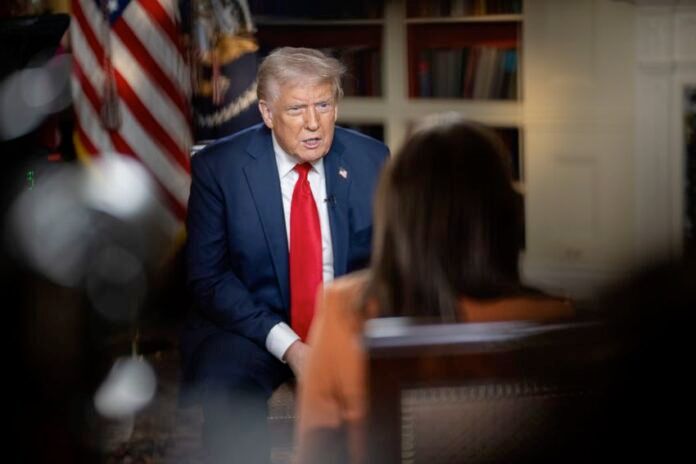by the El Reportero wire services
United States President Donald Trump asserted in an interview broadcast on Tuesday that Mexico is “very afraid” of drug cartels, which he claimed “run large sections” of the country.
He made the assertions in an interview with Fox News after interviewer Rachel Campos-Duffy asked him what his plan is to combat Mexican cartels.
“So we’re working with Mexico,” he said, referring to the Mexican government led by President Claudia Sheinbaum.
“Mexico is, I think, very afraid of the cartels actually. I think the cartels run large sections of Mexico and I don’t want to say that because I’m getting along very well with the president,” Trump said.
Without providing any source for her claim, Campos-Duffy responded that “40% of the land mass in Mexico is controlled by the cartels.”
“Yeah, maybe at least, OK,” Trump said. “You know, at least, it’s hard to believe.”
In an address to the U.S. Congress last month, Trump hyperbolically asserted that cartels have “total control” over Mexico and pose “a grave threat to our national security.”
In his Tuesday interview with Fox, the U.S. president went on to say that he is “dealing very nicely” with Sheinbaum, whom he described as “a very fine woman.”
“…The relationship is very good and we want to help her and we want to help Mexico because you can’t run a country like that, you just can’t,” he said.
“[The cartels] have made a fortune and I will say it’s been cut back, way back, because of the border. The border is very, very secure right now,” Trump said.
The interview was broadcast the same day that the United States Department of the Interior announced the transfer of a large swath of land along the U.S.-Mexico border to the U.S. army.
“The land will be transferred to the Department of the Army for a period of three years, subject to valid existing rights. This action is intended to safeguard sensitive natural and cultural resources in the region while enabling the Department of the Army to support U.S. Border Patrol operations in securing the border and preventing illegal immigration,” the department said.
Earlier this month, NBC News reported that the Trump administration was considering carrying out drone strikes on cartels in Mexico.
On the first day of his second term, the U.S. president was asked whether he would consider “ordering U.S. special forces into Mexico” to “take out” cartels.
“Could happen, stranger things have happened,” said Trump, who last year indicated he was open to using military “strikes” against Mexican cartels.
Sheinbaum rejects assertion that her government is afraid of cartels
At her Wednesday morning press conference, Sheinbaum rejected Trump’s claim that her government is “afraid” of cartels.
She said that Trump and other U.S. officials have their own unique “way of communicating” — an expression she has used previously to effectively dismiss incendiary remarks made by the U.S. president.
Sheinbaum said that the federal government’s security cabinet is “acting every day” to combat crime and violence in Mexico.
“… There is a reduction in crime and the reduction will continue,” she said.
Trump’s cartel control claim
There are various estimates on the percentage of territory that cartels “control” in Mexico, but it is important to stress that they are just that — estimates.
According to a May 2024 estimate from the U.S. military, cartels control around one-third of Mexico’s territory.
In March 2021, the then-commander of the United States Northern Command, General Glen D. VanHerck, said that “transnational criminal organizations” operate “oftentimes in ungoverned areas” that account for “30% to 35% of Mexico.”
Former president Andrés Manuel López Obrador rejected that claim, while in an interview with 60 Minutes last year, he said he “can travel throughout the entire country without problem.”
“There is no region that I cannot go and visit,” he said.
In a 2024 article headlined “How much of Mexico is governed by cartels?” Mexico-based British journalist Ioan Grillo wrote that “cartels certainly exert an amount of control in chunks of Mexico.”
“This can be seen in squads of gunmen operating openly, running checkpoints, ordering curfews, dictating what journalists can report, charging quotas on sales of avocados, moving votes for candidates, and controlling (or assassinating) mayors,” he wrote.
“Yet unlike with the Islamic State caliphate, the Mexican government still operates in those turfs. It provides electricity, sends teachers and collects garbage. And the army can still go in (while the cartel gunmen hide) and then leave (and they come out again),” Grillo added.
A summary of security developments since Trump took office
There have been a number of security-related developments in Mexico and the United States since Trump began his second term on Jan. 20.
Since Trump returned to the White House, Sheinbaum has repeatedly said that her government is willing to collaborate and cooperate with the United States on security issues, while stressing that it will not accept subordination or any violation of Mexico’s sovereignty. The Mexican government provides regular updates on its progress in combating organized crime, during which it has highlighted that arrests, drug seizures and firearms confiscations are on the rise while homicides are declining.



